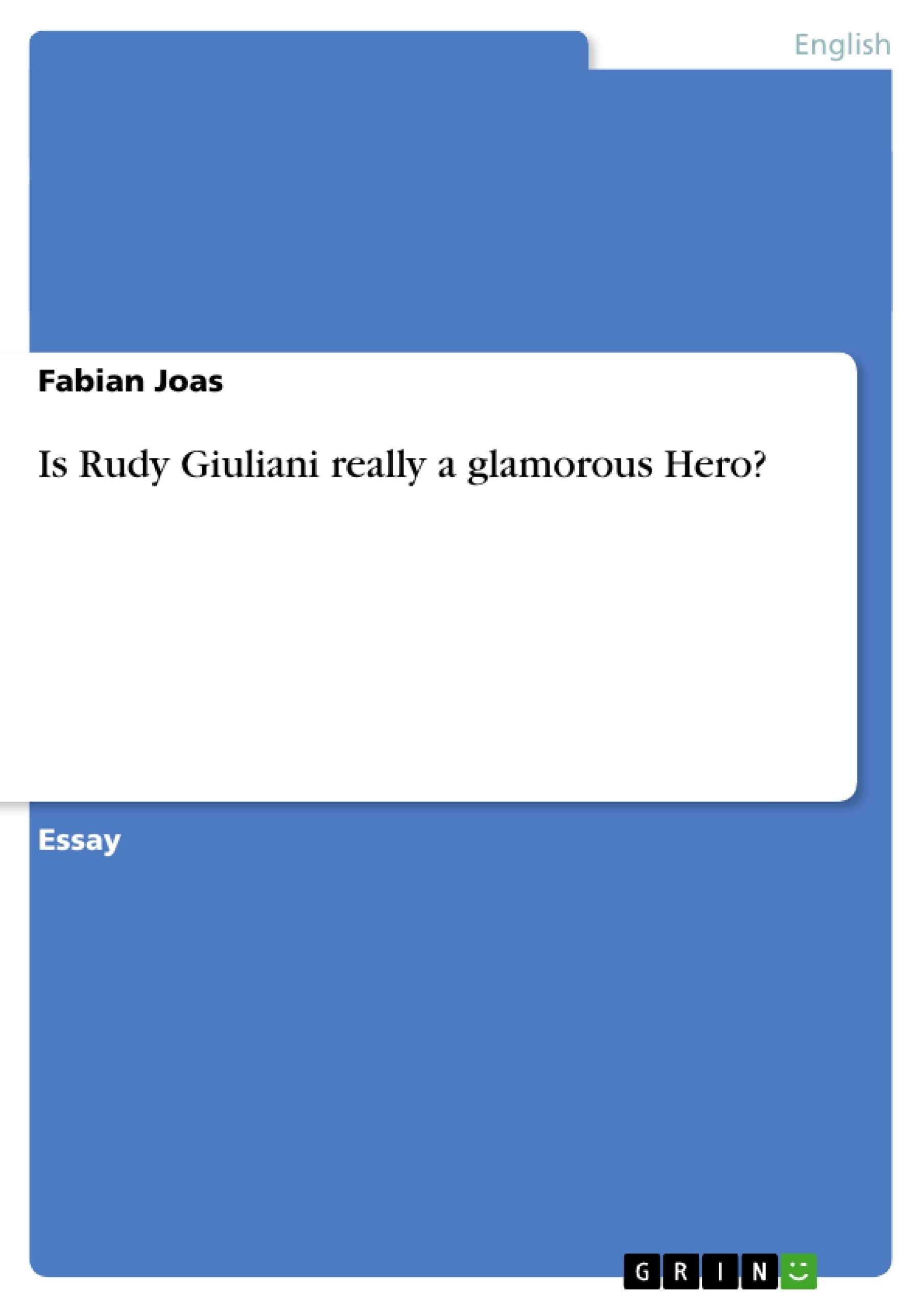When the town Baden-Baden gave the German Media Price to Rudy Giuliani in February 2002, I was very surprised. Certainly the price was awarded for Giuliani′s great Leadership in very difficult times, but how could the committee have forgotten everything what happened before September 11th? Had Rudy Giuliani, a man who was criticized especially in Germany for his merciless behaviour toward homeless people and minority groups, now also become a hero in Germany? Before deciding what kind of character Rudy Giuliani really is, it is important to take a closer look at his background and political career.
Rudolph W. Giuliani was born in a working class family in Brooklyn, New York in 1944. He is the grandson of Italian immigrants. He attended Bishop Loughlin Memorial High School (Class of ′61) in Brooklyn. In high school Giuliani had been what Americans call an "extracurricular activity junkie" (Barret and Fifield 34). He was a member of the baseball and weightlifting teams. He participated in a charity club, and even as a freshman he liked to take on responsibility and was voted homeroom president. As he grew older his interest in politics increased and he spent long nights with friends "discussing philosophy, religion and politics" (Barret and Fifield 35). In those discussions Giuliani always claimed to be a young man with very high moral standards. At the end of his senior year he was awarded "Class Politician" (Barret and Fifield 36) by his classmates. At that time nobody could have known how right their decision was. In the fall of 1961 Giuliani enrolled in Manhattan College (Class of ′65) in the Bronx. The atmosphere at the all-male college was similar to his high school. There was a mandatory dress code, tardiness was treated harshly, liquor was banned from campus and women were not allowed in the dormitories. Rudy Giuliani graduated in 1965 with honors but not with magna cum laude, a fact he often emphasizes. In the fall of 1965 Giuliani entered Law school at New York University (Barret and Fifield 37-41).
Rudy was already politically active at that time and a classmate remembers him as a "real Robert F. Kennedy democrat, a liberal, except on law and order" (Barret and Fifield 53). Giuliani had deeply admired Bobby Kennedy and when he was murdered "[he] thought [his] presence in national politics was irreplaceable" (Barret and Fifield 55) [...]
Inhaltsverzeichnis (Table of Contents)
- I. Is Rudy Giuliani really a glamorous Hero?
- Giuliani's childhood and career from district attorney to the most powerful figure in New York City.
- II. Giuliani as a great leader in difficult times.
- III. Giuliani used controversial methods as a major.
- The zero tolerance policy.
- The big Sweep
- Giuliani, a racist?
- IV. A review and outlook in the future
Zielsetzung und Themenschwerpunkte (Objectives and Key Themes)
This essay aims to examine the life and career of Rudy Giuliani, specifically focusing on his time as mayor of New York City and his leadership in the wake of the September 11th attacks. It also explores the controversial methods he employed during his time as mayor, including the "zero tolerance" policy and its impact on the city.
- Giuliani's leadership in the aftermath of the September 11th attacks
- Giuliani's controversial policies as mayor of New York City
- The "zero tolerance" policy and its impact on crime rates
- The criticism surrounding Giuliani's approach to homelessness and minority groups
- Giuliani's legacy as a leader and his impact on New York City
Zusammenfassung der Kapitel (Chapter Summaries)
The essay begins by exploring Giuliani's early life and political career, detailing his rise from district attorney to mayor of New York City. It then delves into his leadership during the September 11th attacks, highlighting his efforts to provide support to victims and families, and his role in helping New York City to recover. The essay continues by examining Giuliani's controversial policies, specifically the "zero tolerance" policy, which aimed to reduce crime through stricter enforcement of minor offenses. The essay discusses the effectiveness of this policy and the criticisms it faced, including accusations of racial bias and unfair treatment of marginalized communities. Finally, the essay concludes by assessing Giuliani's overall legacy as a leader and his enduring impact on New York City.
Schlüsselwörter (Keywords)
The main keywords and focus topics of this text include Rudy Giuliani, leadership, New York City, September 11th attacks, "zero tolerance" policy, crime, homelessness, minority groups, racial bias, and political legacy. These keywords encompass the primary themes and concepts explored in the text, including Giuliani's leadership qualities, his controversial policies, and the impact of his actions on the city and its residents.
Frequently Asked Questions
Why was Rudy Giuliani considered a hero in 2002?
Giuliani gained international praise for his strong leadership and support for victims and families following the September 11th attacks in New York City.
What was Giuliani's "zero tolerance" policy?
It was a controversial policing strategy aimed at reducing major crime by strictly enforcing laws against minor offenses like panhandling and graffiti.
What criticisms did Giuliani face as Mayor?
He was heavily criticized for his treatment of homeless people, minority groups, and accusations of racial bias in his law enforcement policies.
What is Rudy Giuliani's professional background?
Born in Brooklyn in 1944, he rose to prominence as a District Attorney before becoming the Mayor of New York City.
How did his "Big Sweep" impact NYC?
The "Big Sweep" was part of his effort to clean up the streets, but it was seen by many as a merciless campaign against the city's most vulnerable residents.
Was Giuliani always a Republican?
Interestingly, a former classmate remembers him as a "Robert F. Kennedy democrat" in his youth, showing a shift in his political identity over time.
- Quote paper
- Fabian Joas (Author), 2002, Is Rudy Giuliani really a glamorous Hero?, Munich, GRIN Verlag, https://www.grin.com/document/9902



